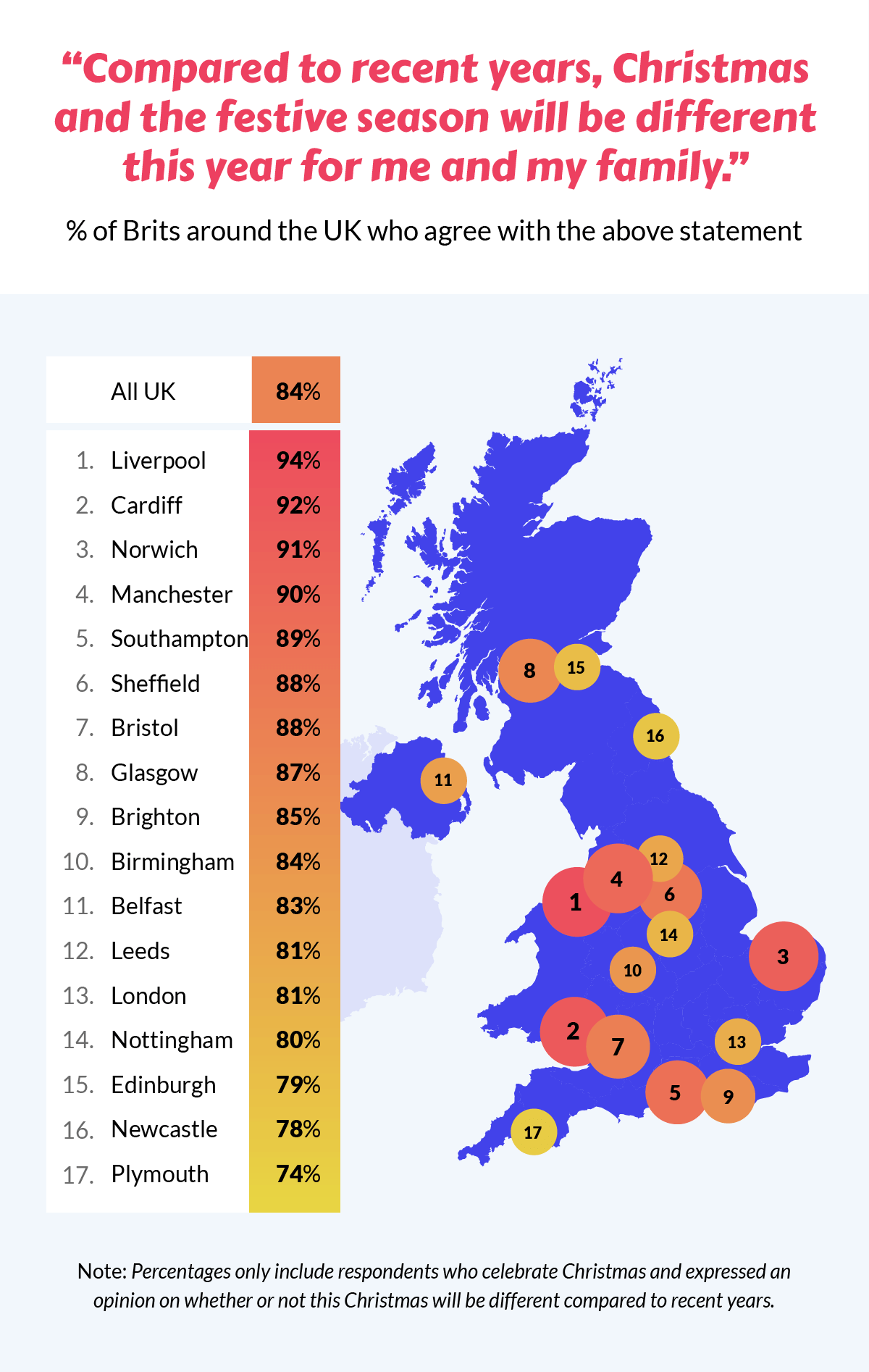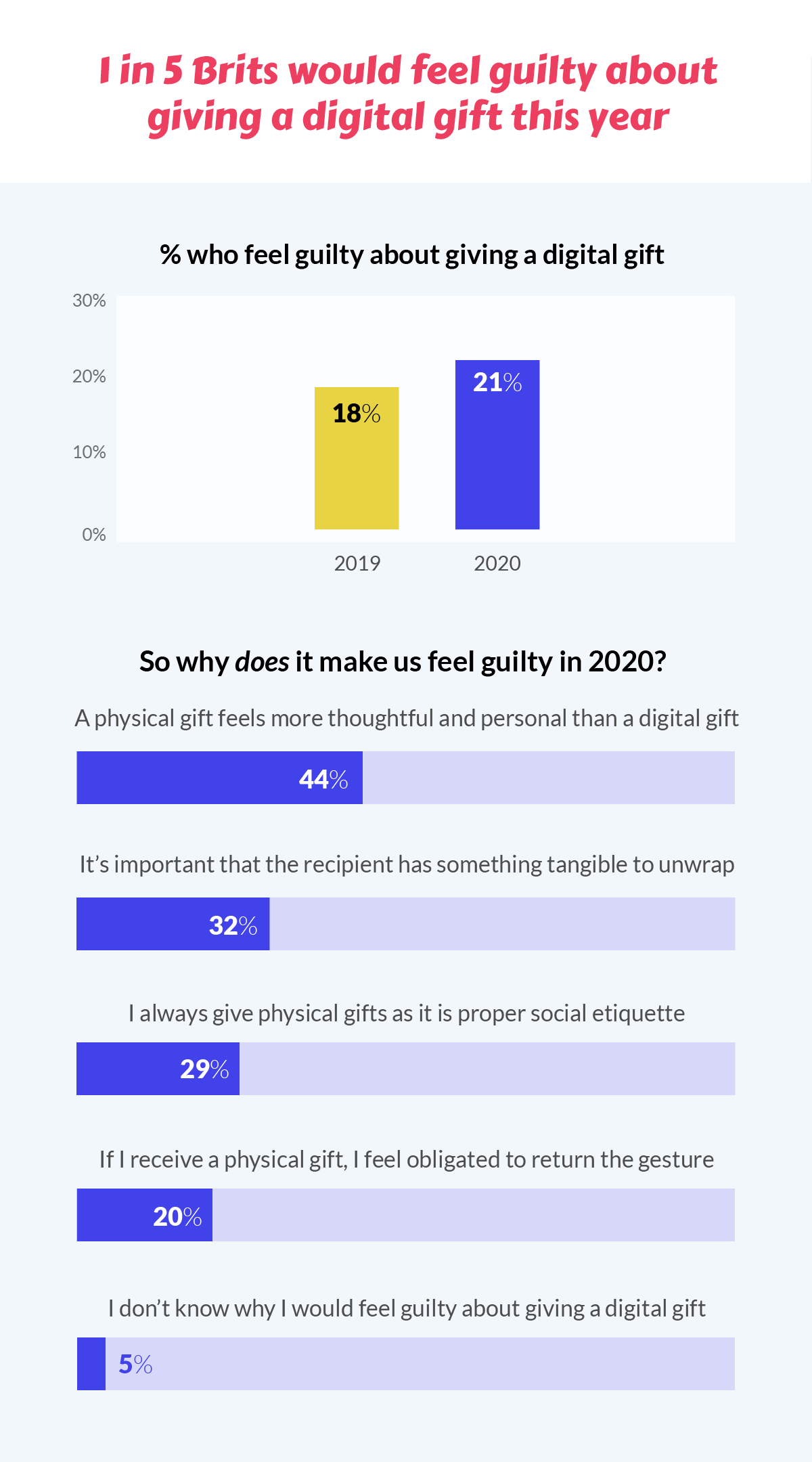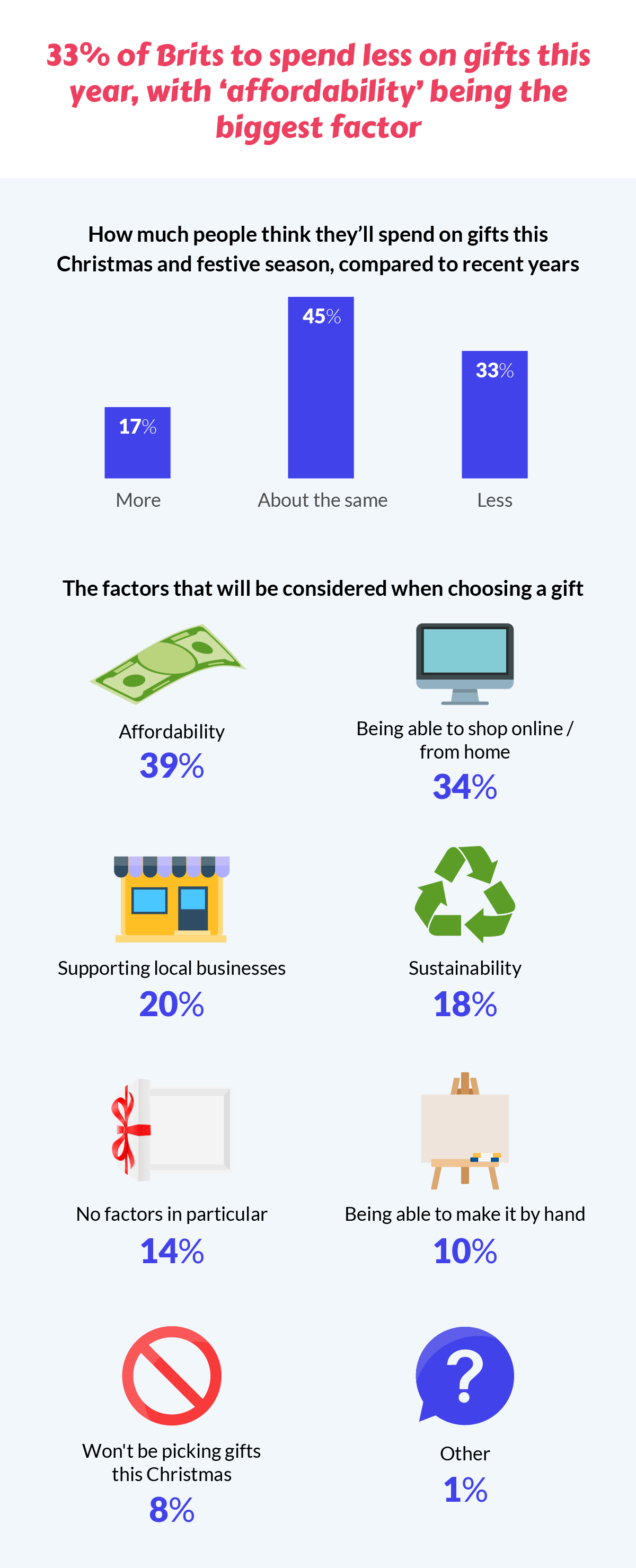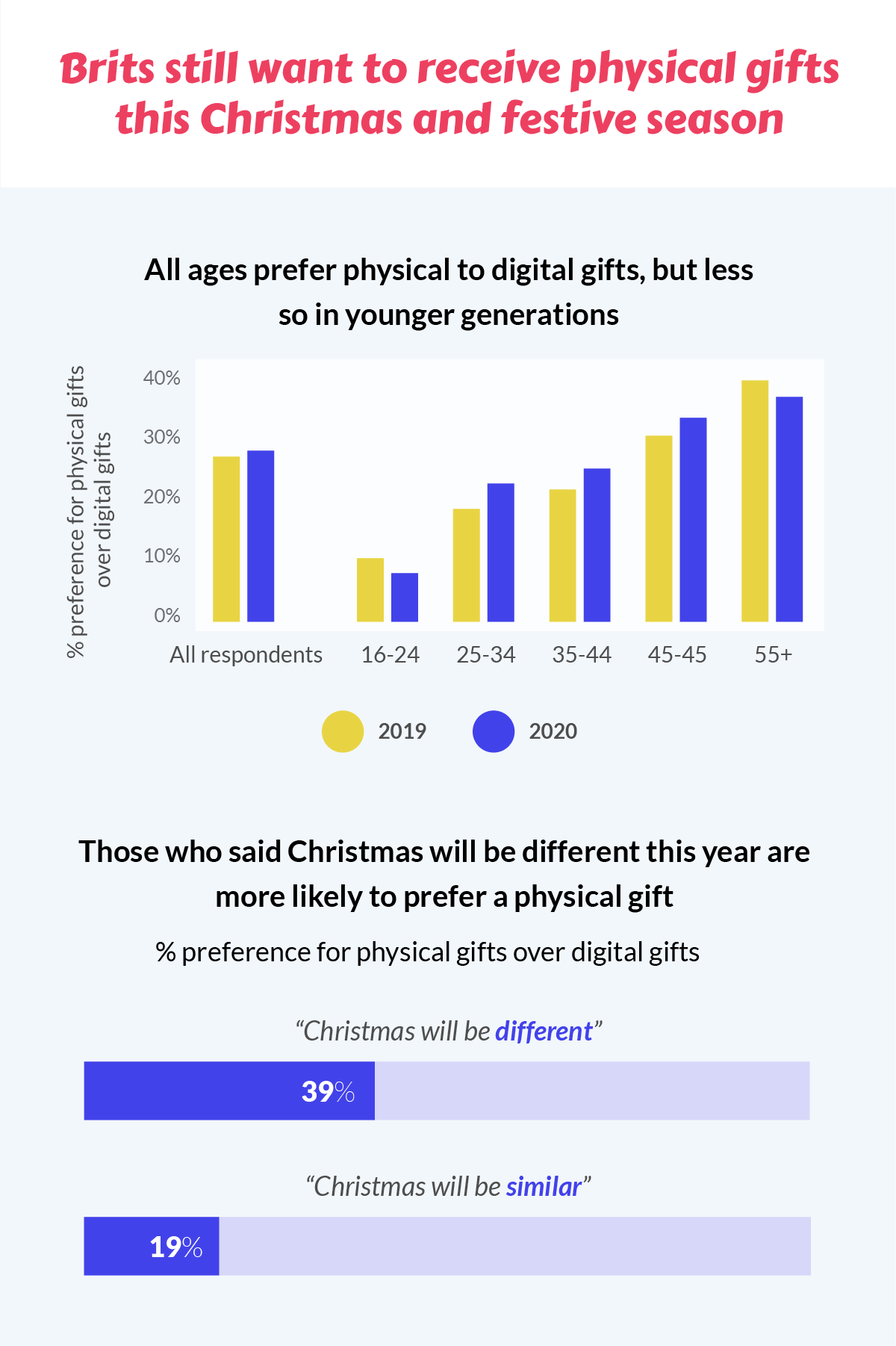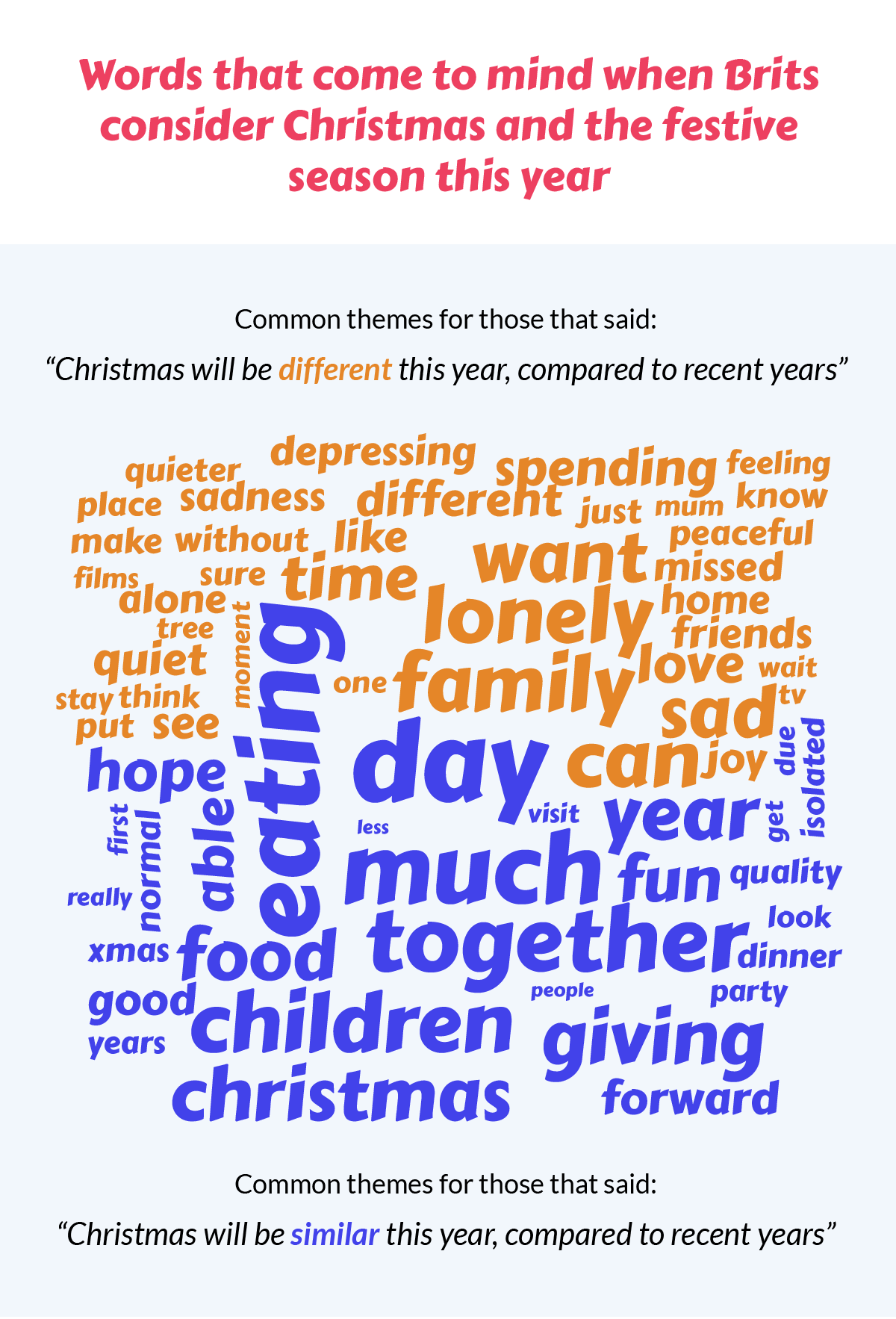It’s been a crazy rollercoaster of a year. Marked by a global pandemic that has put the planet on hold, 2020 has separated so many of us, while simultaneously bringing others closer together.
There’s no doubt that this year has made many of us reassess what matters most. But where do we stand when it comes to Christmas – has it become irrelevant in the grand scheme of things? Or showcased just how special the festive season truly is?
Last year, in the world that existed before Zoom calls and social distancing, the nation said gifting was still the way to give love. Yet, as our lives have changed and priorities shifted, is there still a place in our hearts for tinsel, trees and gift boxes? We wanted to explore Brits’ buying habits in light of this life-altering year, as well as how people are feeling in the lead up to Christmas. We surveyed 1,000 Brits across the UK, and here’s what we found out.
The act of giving still matters…
Of respondents who expressed an opinion, 84% of the nation has agreed that Christmas 2020 will be different for their family and themselves this year. Cities such as Liverpool (94%) and Cardiff (92%) (who have undergone some of the harshest forms of lockdown) reported feeling this the most.
And with the rules around Christmas being so uncertain, it seems there are some traditions that we’re desperate to cling onto. Enter: the giving of gifts. In fact, only 8% of Brits surveyed won’t be doing this, meaning that the majority of the population are still undertaking pressie procuring in some form or other this year.
It seems that the physical element of a present matters now, more than ever, too. Compared to last year’s survey, the amount of people who would feel guilty about not sending a physical gift has increased by a margin of 3%, taking it to a total of 21%. Of those that would feel guilty, the two key reasons given were a) because physical gifts feel more thoughtful (44%) and b) because it’s important the recipient has something tangible to unwrap (32%). Could this mean that while the act of giving has always mattered, it means that little bit more this year?
…but how we buy will be different
We also found that, understandably, our buying habits are shifting. It comes as no surprise that affordability is the biggest priority for Brits this festive season, with over 39% listing this as a factor they will consider when shopping. A third of the nation (33%) will be tightening the belt straps and spending less than they usually do (females more so than males), which is twice as many people as those spending more than normal.
As well as affordability, there were some other interesting insights as to what factors people will consider. Naturally, with online shopping up by 43% year-on-year at the end of October (according to Capgemini’s Online Retail Index), this looks set to continue into our festive shopping sprees. 34% of the British public said they’ll need to consider being able to shop online or from home this festive season and, perhaps more remarkably, this trend is consistent across all age demographics.
Last year, we were told that 18% of the population had been deterred from choosing a gift based on its environmental impact. This year, the same percentage of people picked eco-consciousness as a key consideration for choosing gifts, though shopping locally is taking higher priority. Thanks to the many commendable campaigns that have fought for the estimated 6 million small businesses (and 16.6m jobs) that are in a financially precarious position this year, over 1 in 5 people (20%) now say that this will be a factor in their gifting choice.
Finally, you may remember that the dawn of lockdown brought a boom in crafts, from masks for frontline workers, to knitted dolls of Captain Sir Tom Moore. In fact, John Lewis reported upticks in haberdashery sales, while the likes of Hobbycraft reported a 200% boom in online sales since lockdown began. It seems that those aged 16-34 are leaning into this revolution even further this festive season, with a whopping 34% saying they’ll want to make their gifts by hand.
Recipients still want something tangible to open…
Ultimately, we’re still a sentimental bunch when it comes to having something tangible under the tree to open.
Last year, we asked people if they would prefer either a physical or digital gift (such as an e-card, e-voucher, or e-gift), and found that people preferred physical gifts by a margin of 29%. This year, it has ever so slightly increased, perhaps as our yearning for ‘normality’ grows.
Interestingly, for those who said Christmas would be different this year, they preferred a physical gift by a difference of 38% (8% vs. 47%). Yet for those expecting a similar Christmas to normal, the preference for physical gifts was far smaller, with a difference of only 19%. Again, could this be a sign that for those whose Christmases will be out of the ordinary, a physical gift can act as an anchor amid an uncertain year, and a way to feel closer to our family and friends?
This isn’t to say the younger generation aren’t turning the tables, however. While all ages have a significant preference for physical gifts, younger people who would prefer a digital gift have grown by a margin of 5% this year. In fact, for 16-24-year olds, the difference between their preference for physical gifts vs digital is closing at only 8%, compared with 32% for over 25-54s, and 38% for 55+s! If things were to continue on this trajectory, by 2023, digital gifts might have become the chosen gift for Gen-Zers.
…even if emotions on Christmas are mixed this year
While the year has undeniably brought many lows, we have seen some positives from stronger relationships to new innovations and flexible working. We wanted to know if 2020 has been more negative or positive for Brits personally, compared to recent years. 40% said more negative, 17% said more positive and 35% said about the same. But, what about peoples’ feelings towards the festive season, specifically?
We asked respondents to express any words that come to mind when thinking about the upcoming festive season. Among the words most used by those expecting Christmas to be different this year ranged from ‘family’, ‘lonely’ and ‘depressing’ – while for those expecting it to be the same, it ranged from ‘indifferent’ and ‘awful’, to ‘hope’, ‘together’ and ‘eating’.
One Christmas optimist told us,
“Christmas is the look of joy on the faces of my grandchildren as they open up their presents and it’s exactly what they want. It’s the twinkling lights on the tree, the soppy Christmas films on TV, the hefty lunch. It’s the ‘You shouldn’t of’, ‘Oh, that’s lovely’ and the classic, ‘You know me too well.”
And yet, there’s no ignoring the hardship that this year has brought about for so many. We heard from a lot of people worrying about a whole host of things this year, from loneliness and isolation, to financial pressures.
“Loneliness, anger, depression, feeling like the worldwide community has yet again something to disagree with each other about (C19).”
“I just want to treat it like another day. I can’t cope with all the stress it brings due to financial circumstances.”
Can you still spread some festive cheer?
So where do you stand on Christmas this year? If you love giving, and are in a position to contribute towards a smile this Christmas, here are just a few ways we can all help those that may need it most:
Checking in on the elderly people in your community: As we know, the elderly are in the most vulnerable category across a range of factors – and a recent Age UK survey found that those over 65 often feel invisible or ignored. Whether it’s taking the time to write a Christmas card to elders in your building or offering your assistance to someone who can’t do their shopping, do your bit to make sure they’re noticed.
Putting together a gift box: There are many charities that organise shoe box appeals, such as Operation Christmas Child. However, there may also be other organisations local to your area doing a similar thing, on a smaller scale. Look out for neighbourhood Facebook groups or regional charities close to your home that may be looking for gift boxes and presents to put together for those feeling the strain.
Fight for food banks: Use of food banks are at a record high this year, with The Trussell Trust reporting a 61% increase compared to last year. There are many ways we can help, from volunteering our time to fundraising or making regular donations. You can visit The Trussell Trust website to see a list of ways that you may be able to offer something.
While 2020 has brought a lot of uncertainty to our lives, what is certain as we approach the festive season is the importance of family, friends, community, and togetherness. Whether you’re spending the festive season in isolation or with loved ones, try to reach out to those around you. After all, what can be closer to the true meaning of Christmas?














